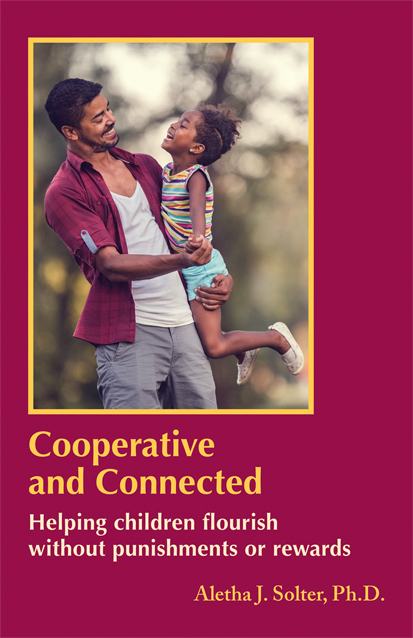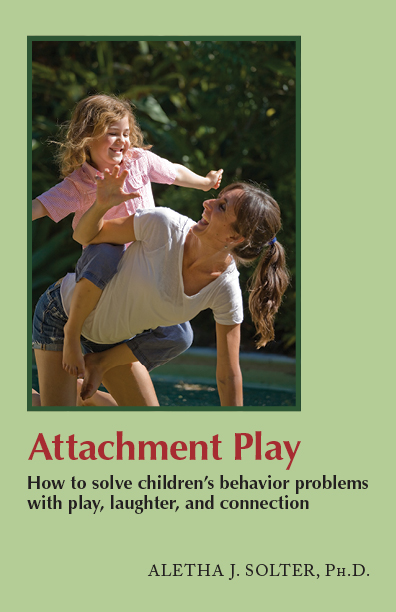Making doctor visits a pleasant experience for children
by Aletha Solter, Ph.D.
Question:
My daughter is eight years old and is still frightened to see a doctor. I would like to know if there are any tips on how to get kids to go to the doctor without being scared. Thank you.
Answer:
It's common and normal for children to fear doctor visits. Sometimes children who have had painful experiences involving needles (vaccinations or blood tests) develop a needle phobia. However, with adequate preparation, visits to the doctor can go smoothly. There are several things you can do to prepare your daughter so she will know what to expect, reduce her fears, and increase her willingness to cooperate.
For non-emergency situations:
Your daughter is old enough to understand why certain medical exams and procedures are necessary, so I suggest that you read age-appropriate books to her about doctors, vaccinations, and illness. This can provide her with opportunities to ask questions, voice concerns, and clarify misconceptions.
Another way to prepare her and reduce her fear is to role-play the doctor's visit ahead of time. This is especially useful when there will be a painful procedure such as a vaccination or blood test. You can use a doctor's kit and play the role of the doctor. To elicit laughter, you can pretend to be an incompetent doctor who doesn't know how to do things right. You can also use a doll or stuffed animal as the patient and encourage your child to be the doctor. Or you can play the role of the patient and let your child play the role of the doctor. In this case, you can put on a mock display of terror and resistance and let your child "win" by finally giving you the imaginary vaccination. Anything that helps your child laugh during this role-playing will help reduce her anxiety about going to the doctor. She may want to repeat these games many times. I recommend playing them as often as she wants.
If you tell her about an upcoming doctor appointment too far in advance, she might become increasingly anxious and apprehensive as the weeks go by and be unable to enjoy her daily life. On the other hand, you don't want to wait until the last minute to tell her. At her age, a week in advance is probably reasonable. This will give you time to answer her questions and do some role playing, as suggested above.
For emergency situations:
If your child is sick or injured and needs to go to the doctor or hospital immediately, you will not be able to give much advance warning. You can simply say that you need to take her to the doctor. While on the way, you can explain what the doctor will probably do. For example, if you suspect that she has an ear infection, you can say, "The doctor will look into your ear to find out if there is an infection, and might prescribe some medicine to help it heal. The doctor may also look into your mouth and nose, and tap your chest, like this." (Demonstrate what the doctor will do.)
In general:
- Stay with your child. Part of children's fear of doctors is a fear of being abandoned. It is therefore very important that you stay with your child at all times, no matter how old she is. This may not be possible if your child needs surgery or an X-ray, but in all other situations, you can insist that you be permitted to stay with your child. Doctors and nurses sometimes tell parents to leave because they claim that children are more cooperative without their parents. This may be true, but it's only because some children become passive and docile when they are feeling terrified. It is not worth the sense of betrayal and abandonment that will result if you leave your child in the hands of strangers in a frightening situation. This will only add to your child's stress level. Reassure her that you will stay with her as much as possible. If you need to leave for a few minutes (for example, during an X-ray), tell your child that you will be on the other side of the door for your own protection from X-rays and that you will be right back.
- Give choices. Whenever possible, it is always helpful to give children choices, which will help to reduce feelings of anxiety and powerlessness. For example, you can let her choose which arm to have a vaccination in or which finger to have pricked for a blood test. An eight-year-old is old enough to decide for herself whether she needs pain medication.
- Let your child express emotions. It is important to let children express emotional and physical pain. It is normal and healthy for children to cry when they are frightened or hurt. You can help by acknowledging and reflecting back your daughter's feelings: "You're feeling pretty scared. It's okay to be scared about getting a shot. It might hurt a little, but it will soon be over." If they are experiencing physical pain, you can say, "I know it really hurts. It's okay to cry." Avoid praising her for being "brave" (if this implies that she didn't cry). If the health practitioners try to stop or distract your child from crying, you can say calmly but firmly, "She's feeling very upset right now, and it's important for her to know that it's okay to cry here." This will help to reassure the nurses that you are not expecting them to do something to stop her from crying. Being allowed to cry freely will help to prevent later nightmares and phobias that often occur after traumatic experiences.
- Role-play the visit afterwards. After you have returned from the doctor, whether it was an emergency or non-emergency visit, it is helpful to role-play the visit again using a toy doctor's kit. You can encourage your daughter to be the doctor while you play the role of the child. This activity will help her process what happened and reduce any residual anxiety or frustrations.
About Aletha Solter:
Aletha Solter, PhD, is a developmental psychologist, international speaker, consultant, and founder of the Aware Parenting Institute. Her books have been translated into many languages, and she is recognized internationally as an expert on attachment, trauma, and non-punitive discipline.
Aware Parenting is a philosophy of child-rearing that has the potential to change the world. Based on cutting-edge research and insights in child development, Aware Parenting questions most traditional assumptions about raising children, and proposes a new approach that can profoundly shift a parent's relationship with his or her child. Parents who follow this approach raise children who are bright, compassionate, competent, nonviolent, and drug free.

